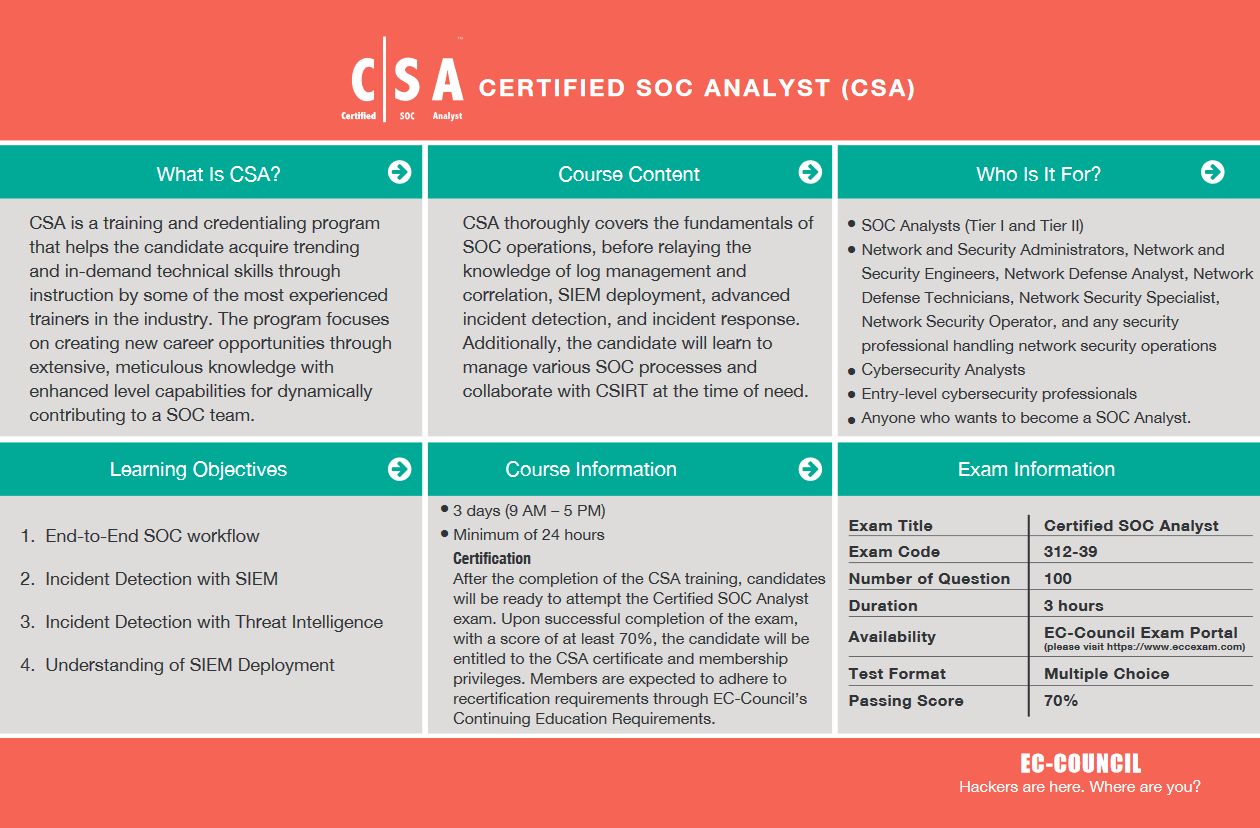Enroll now to get details on Plans & Pricing
CERTIFIED SOC ANALYST (CSA)
Course Description
The Certified SOC Analyst (CSA) program is the first step to joining a security operations center (SOC). It is engineered for current and aspiring Tier I and Tier II SOC analysts to achieve proficiency in performing entry-level and intermediate-level operations.
CSA is a training and credentialing program that helps the candidate acquire trending and in-demand technical skills through instruction by some of the most experienced trainers in the industry. The program focuses on creating new career opportunities through extensive, meticulous knowledge with enhanced level capabilities for dynamically contributing to a SOC team. Being an intense 3-day program, it thoroughly covers the fundamentals of SOC operations, before relaying the knowledge of log management and correlation, SIEM deployment, advanced incident detection, and incident response. Additionally, the candidate will learn to manage various SOC processes and collaborate with CSIRT at the time of need.

NASCIO Representing Chief Information Office of the States revealed in over a year-long survey (July 2016 – December 2017), “since the creation of the SOC, the security division has seen an overall 64 percent decrease in incident response time.”

As the security landscape is expanding, a SOC team offers high-quality IT-security services to detect potential cyber threats/attacks actively and quickly respond to security incidents. Organizations need skilled SOC Analysts who can serve as the front-line defenders, warning other professionals of emerging and present cyber threats.
The lab-intensive SOC Analyst training program emphasizes the holistic approach to deliver elementary as well as advanced knowledge of how to identify and validate intrusion attempts. Through this, the candidate will learn to use SIEM solutions and predictive capabilities using threat intelligence. The program also introduces the practical aspect of SIEM using advanced and the most frequently used tools. The candidate will learn to perform enhanced threat detection using the predictive capabilities of Threat Intelligence.
Recent years have witnessed the evolution of cyber risks, creating an unsafe environment for the players of various sectors.
To handle these sophisticated threats, enterprises need advanced cybersecurity solutions along with traditional methods of defense. Practicing good cybersecurity hygiene and implementing an appropriate line of defense, and incorporating a security operations center (SOC) has become reasonable solutions. The team pursues twenty-four-hour and “follow-the-sun” coverage for performing security monitoring, security incident management, vulnerability management, security device management, and network flow monitoring. Read more about the functions of SOC here.
A SOC Analyst continuously monitors and detects potential threats, triages the alerts, and appropriately escalates them. Without a SOC analyst, processes such as monitoring, detection, analysis, and triaging will lose their effectiveness, ultimately negatively affecting the organization.
Target Audience
Suggested Duration
Enroll now to get details on Plans & Pricing
Certification
After the completion of the CSA training, candidates will be ready to attempt the Certified SOC Analyst exam. Upon successful completion of the exam, with a score of at least 70%, the candidate will be entitled to the CSA certificate and membership privileges. Members are expected to adhere to recertification requirements through EC-Council’s Continuing Education Requirements.
- Exam Details
- Exam Eligibility Requirement
- At a Glance
- Brochure
- Training Options
- Course Outline
Certified SOC Analyst Exam Details
The CSA exam is designed to test and validate a candidate’s comprehensive understanding of the job tasks required as a SOC analyst. Thereby, validating their comprehensive understanding of a complete SOC workflow.| Exam Title | Certified SOC Analyst |
| Exam Code | 312-39 |
| Number of Questions | 100 |
| Duration | 3 hours |
| Availability | EC-Council Exam Portal (please visit https://www.eccexam.com) |
| Test Format | Multiple Choice |
| Passing Score | 70% |
Exam Eligibility Requirement
The CSA program requires a candidate to have one year of work experience in the Network Admin/Security domain and should be able to provide proof of the same as validated through the application process unless the candidate attends official training.

Training Options
iLearn (Self-Study)
This solution is an asynchronous, self-study environment that delivers EC-Council’s sought-after CSA, SOC Analyst training courses in a streaming video format.
Master Class
This solution offers you the opportunity to learn the CSA, SOC Analyst training program, from world-class instructors and the opportunity to collaborate with top Infosecurity professionals.
Training Partner (In Person)
This solution offers “in-person” training for SOC Analyst so that you can get the benefit of collaborating with your peers and gaining real-world skills, conveniently located in your backyard.
Course Outline
- Module 01: Security Operations and Management
- Module 02: Understanding Cyber Threats, IoCs, and Attack Methodology
- Module 03: Incidents, Events, and Logging
- Module 04: Incident Detection with Security Information and Event Management (SIEM)
- Module 05: Enhanced Incident Detection with Threat Intelligence
- Module 06: Incident Response
8 Critical Components of CSA
- Modus operandi of different type of attacks at application, network and host level to understand thier IOCs
- Working of local and centralized logging concepts which demonstrates how logs are pulled from the different devices on the network to facilitate incident monitoring, detection, and analysis
- Examples of SIEM use case development for detecting application, network and host level incidents using various SIEM tools
- Triaging of alerts to provide rapid incident detection and response
- Prioritization and escalation of incidents by generating incident ticket
- The containment of incidents
- The eradication of incidents
- The recovery from the incidents
- Creating report of the incidents
Learning Objectives of CSA
Enroll now to get details on Plans & Pricing
Testimonials




With this kind of growth in the market, it is inevitable that there is a strong demand for IT professionals.
Take a look at the current jobs listed on leading job portals on SOC Analyst job roles:



Learning Resources





